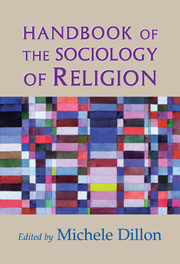Book contents
- Frontmatter
- Contents
- List of Contributors
- Acknowledgment
- Part One Religion as a Field of Sociological Knowledge
- Part Two Religion and Social Change
- Part Three Religion and the Life Course
- Part Four Religion and Social Identity
- Part Five Religion, Political Behavior, and Public Culture
- Part Six Religion and Socioeconomic Inequality
- 26 Religion, Faith-Based Community Organizing, and the Struggle for Justice
- 27 Latina Empowerment, Border Realities, and Faith-Based Organizations
- 28 “Worldly” or “Other Worldly”?
- References
- Index
27 - Latina Empowerment, Border Realities, and Faith-Based Organizations
Published online by Cambridge University Press: 05 June 2012
- Frontmatter
- Contents
- List of Contributors
- Acknowledgment
- Part One Religion as a Field of Sociological Knowledge
- Part Two Religion and Social Change
- Part Three Religion and the Life Course
- Part Four Religion and Social Identity
- Part Five Religion, Political Behavior, and Public Culture
- Part Six Religion and Socioeconomic Inequality
- 26 Religion, Faith-Based Community Organizing, and the Struggle for Justice
- 27 Latina Empowerment, Border Realities, and Faith-Based Organizations
- 28 “Worldly” or “Other Worldly”?
- References
- Index
Summary
Any discussion of Latinas must begin with some understanding of their experience within the larger context of their communities. To understand Latino/a empowerment in faith-based communities, this chapter begins with a brief overview of the Latino/a religious experience and then outlines Latinas' particular contributions to faith-based community activist organizations. The research literature on Latinos and Latinas and their place in the U.S. religious mosaic parallels non-Latino/a immigration stories when consideration is given to the role of religion and religious institutions within ethnic enclaves. These ethnic studies can be useful because they highlight nuances that sometimes are glossed over by sweeping immigration theories. As Jaime Vidal (Dolan and Vidal 1994) found when looking at the Puerto Rican migration story, there were nuances to the Puerto Rican experiences that spilled over into shaping the character of previously established Euro-ethnic faith communities.
One difference was Puerto Rican migrants' insistence on maintaining their culture rather than embracing the expected assimilation with U.S. society: “The insistence of Puerto Ricans on speaking Spanish among themselves and on speaking Spanish at home in order to pass on the language (as a first language!) to the next generation was deeply disturbing and even offensive to Americans, who instinctively perceived it as a rejection of the ‘melting pot,’ a symbolic way of clinging to an alien identity” (Dolan and Vidal 1994: 59).
- Type
- Chapter
- Information
- Handbook of the Sociology of Religion , pp. 400 - 411Publisher: Cambridge University PressPrint publication year: 2003
- 1
- Cited by

